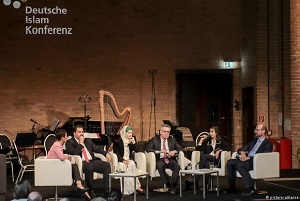Ten Years of the German Islam Conference
For ten years, the German Islam Conference has been discussing the integration of Muslims. It has been established as an institutionalized dialogue with the Muslims living in Germany. The conference has achieved a great deal so far: In some federal states, Islamic religious education has been established in schools. Further, Islamic theology is taught in five different universities. Muslims are part of the chief committees of the public law broadcasting cooperation. The cities of Bremen and Hamburg have even concluded treaties with Muslim organizations, where funeral matters, holidays, or plans for mosque constructions are discussed.
The Islam Conference is located in German Interior ministry and includes members of the State from all federal ranks, representatives of Muslim organizations as well as scientific experts. Mathias Rohe, head of the Erlangen Centre for Islam and Law in Europe, is also a member. When being asked about the success of the Conference by the internet platform Qantara.de, Rohe states: “The biggest success of the Conference is its success.” Due to the conference, Islamic life in Germany had been put on the political agenda: “In times of financial crises and Brexit, this should not be taken for granted.”
The learning process was a win-win situation, Rohe claims: “Not only the knowledge about Islam has been deepened, but also Muslims and their organizations were able to get an understanding about which formal and contentual demands German administrations and polities have.”
While celebrating the ten-year existence of the German Islam Conference, the lawyer and Islamic scholar Rohe participated in a debate together with the minister of the interior, Thomas de Maizière (CSU), Ayman Mazyek from the Central Council of Muslims in Germany and publicist Sineb el-Masrar.
The topic of the debate was: “Muslims in Germany – German Muslims.” It was broadcasted by the television broadcast Phoenix on September 27th and can still be found on Youtube.Throughout the debate, Rohe states that both sides had been learning about the needs of German Muslims, their organizations and of those of the State. “We have made some progress here.” He calls for a variety of competences.
But how can religious equality between the Christian churches and Islam be achieved?
The clear rules of the German religious constitutional law show, exemplified by the Ahmadiyya Muslim Jama’at, that such equality can be achieved. However, one would have to ask about the advantages of such a status. Apart from public recognition participation, it would also include burdens. Furthermore, for many legal contexts, the status was no even needed. Hence, the core question would be another one: How can peaceful coexistence and an authentic Islamic mediation be organized within the restrictions of the German legal state?
See also: articles in the Tagesspiegel and the Deutsche Welle.
